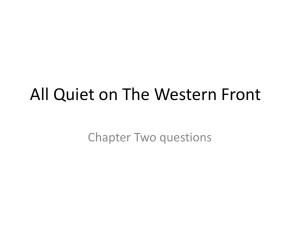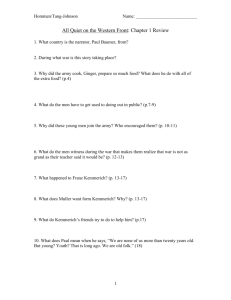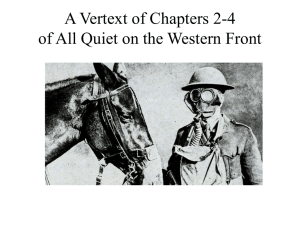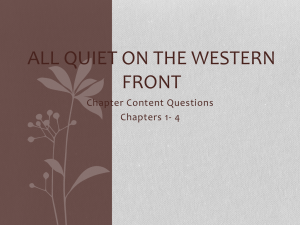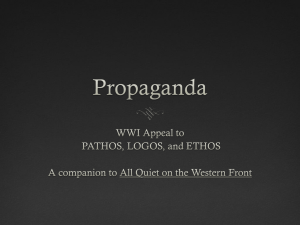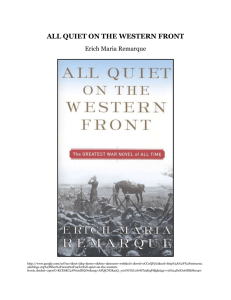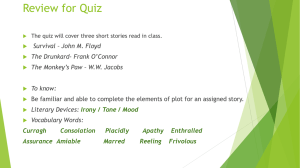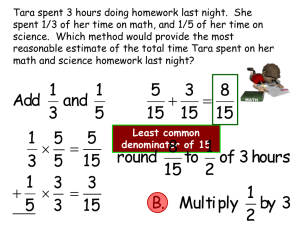File - English with Miss Zachmeier
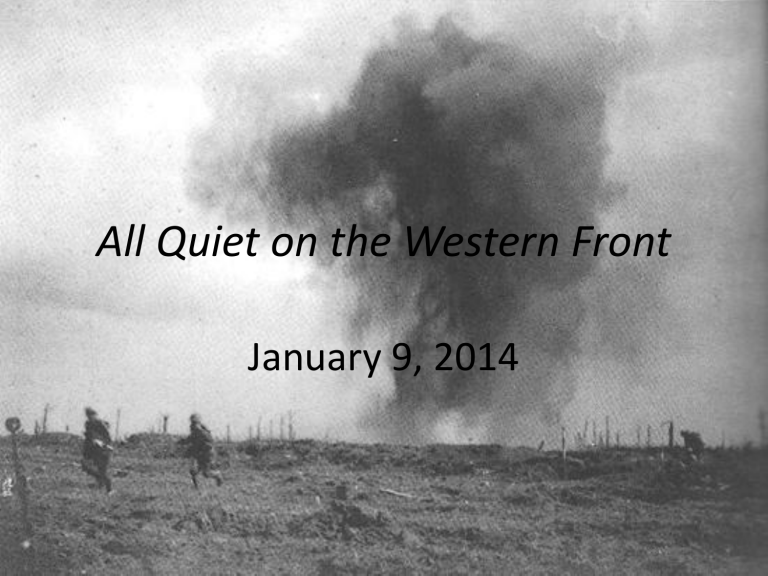
All Quiet on the Western Front
January 9, 2014
Agenda
• Discuss Mini-Project
• Reading Check Quiz
• Discuss Essential Questions for Unit
• Go Over Practice CRL
• Quickwrite
• Drafting Activity
• Discuss Ch. 1-2
• Letter Writing Activity
– HOMEWORK: CRL #1 DUE MON.; GRAMMAR
LESSONS 59-60 DUE MON.; READ CH. 3-4 FOR
TUES.; Mini-Project
READING CHECK QUIZ
• Take out a piece of your own notebook paper and write 1-7 along the left margin.
• Answer the questions.
• Eyes on your own paper, of course; cover your answers while you write with your paper and after you finish.
Reading Check Quiz
• 1. Who is the narrator of the novel?
• 2. Who is Kantorek? What influence did he have on the boys and was it good or bad?
• 3. Why does Paul say, “they let us down so badly”?
• 4. Who is Kemmerich and what happens to him by the end of
Chapter 2?
• 5. What do the other men consider taking from Kemmerich when they visit him?
• 6. Who is Himmelstoss and is he well-liked by the boys?
• 7. Please define ONE of the following terms: disillusionment or alienation. IF YOU WANT AN EXTRA POINT DEFINE BOTH
Reading Check Quiz
• Please swap your paper with another person and write CB: (your name) somewhere below their answers. Please grade in a color different than the one used on the paper.
• There are seven questions but it will be out of ten points. Once you have graded the quiz, please write the total number correct out of ten on the top of the page and return it to its owner.
Reading Check Quiz
• 1. Paul Baumer
• 2. Kantorek was the boys’ schoolmaster back home. He influenced the boys to join the war effort even though he didn’t know what he was really sending them into.
• 3. This quote referred to all of the people convincing and encouraging the boys to join the war.
• 4. Kemmerich is one of Paul’s fellow classmates – they grew up together.
Paul is grappling with the death of his dear friend at the end of Chapter 2.
• 5. The men consider taking Kemmerich’s boots from him when they visit the hospital.
• 6. Himmelstoss is the boys’ Corporal Officer – they don’t like him one bit.
• 7. Disillusionment: a feeling of disappointment resulting from the discovery that something isn’t as good as one believed it to be
Alienation: estrangement; a state of being isolated from an activity to which one should be involved or belong; loss or lack of sympathy
Essential Questions for AQWF
• What are the psychological effects of war on those who fight?
• What difficult ethical dilemmas arise during wartime, and how can they be solved?
• Why would soldiers write poetry?
• What techniques to poets and songwriters use to convey emotions and ideas?
• Which wars are justifiable and which are not?
• Is it possible that the human race could some day end warfare?
Practice CRL
• Please take out the handout from Tuesday regarding the
Close Reading Logs.
• You will first be writing a CRL paragraph with your partner, and then we will review one together as a whole class.
• With your partner,
– Read the passage aloud.
– Find it in the novel, and examine its context.
– Annotate all literary techniques you notice.
– Share out.
– Identify the significance/impact/effect/message of the passage as you see it.
– Write a paragraph starting with a TS that identifies its message and exemplifies it with examples from the passage..
Practice CRL Quote
We learned that a bright button is weightier than four volumes of Schopenhauer. At first astonished, then embittered, and finally indifferent, we recognized that what matters is not the mind but the boot brush, not intelligence but the system, not freedom but drill.
Sample CRL
In this passage, Paul Baumer reflects upon the way in which war causes the abstractions of knowledge and philosophy to give way to the concrete realities of basic human survival. Remarque draws attention to the greater weight that the young men’s military puts upon appearances such as “bright button,” highlighting how absurd their training is, and how poorly it prepares them for the actual fighting they will later face. Even more, however, the parallel antitheses of “what matters is not the mind but the boot brush, not intelligence but the system, not freedom but the drill” emphasize how quickly and completely military training destroys the higher order, individualistic thinking that the young men had strived to develop in their academic educations. With this concise example, Remarque intimates how effectively war destroys individuality and intellect—two qualities antithetical to effective mindless soldiering.
Kantorek Quickwrite
In thinking about the death of his classmate Behm, Paul narrates…
Naturally we couldn’t blame Kantorek for this. Where would the world be if one brought every man to book? There were thousands of Kantoreks, all of whom were convinced that they were acting for the best, in a way that cost them nothing.
And that is why they let us down so badly.
P. 12
Please respond to this quote in your journal. What does Kantorek represent to Paul and the other boys? Was it indeed Kantorek’s fault that Behm joined the effort and was killed? What do you think Paul is trying to say here?
Take about five minutes to think and answer the questions. Be prepared to share with the class.
Tough Choices
• Imagine that you are just graduating from high school.
• You have excelled in English and in math, and despite competitive admissions, your options for university are numerous and promising.
• War breaks out, though, and your friends, also accomplished scholars, are all signing up.
• Recruiters come to your school and your sports matches, attracting new recruits in droves.
• Your friends, uncles, grandfathers, scout troop leaders, coaches and religious leaders all encourage you to sign up and become an adult, contributing to your society and to justice in the world. You can always go to university when you return, as a more experienced and mature student.
• What are two-three plausible options?
What are the possible positives and negatives for each option?
What should you do? Why?
Discussion: Ch. 1-2
• Questions??
• 1. Discuss characters.
• 2. Why do Paul and his friends join the military? In what way are teachers, peers, and parents involved in this decision? Are the recruits influenced more by persuasion or propaganda? How so?
Discussion Ch. 1-2
• 3. Paul makes the observation that the soldier “is on friendlier terms than other men with his stomach and intestines” (8). What does he mean? Why does he consider the whole lavatory episode “beautiful” (9)?
What does this scene reveal about war’s effects on people?
• 4. Why does Paul think the authority figures in his life have let him down? What does he think they were supposed to do? What did they do instead? Do you think it is fair/accurate of him to blame the older generation in this way? (Visit P. 12)
Discussion Ch. 1-2
• 4. Discuss what it means to be called the ‘Iron
Youth’ and the significance of the last line of
Chapter 1 on P 18.
• 5. Which of Paul’s classmates was the only one to express some reservation about joining the war effort before falling in line with the rest of them? What happens to him (be specific) and in what way could it be considered symbolic?
(P 11-12)
Discussion Ch. 1-2
• 6. Revisit Kemmerich’s death scene. Discuss the hours leading up to his death, Paul’s reaction, and the quote, “You know, to-day alone there have been sixteen deaths—yours is the seventeenth. There will probably be twenty altogether—” (P 32).
Letter to Kemmerich’s Mother
• Imagine that you are in Paul’s shoes, fighting the war with your classmates and friends from back home. Kemmerich, whom you grew up with, was fatally injured. As you sit by his side during his final moments, you are overcome with grief when you realize you must write to Kemmerich’s mother, telling her that he won’t be coming back. Considering she asked you to watch over him while saying her goodbyes, you feel it is your duty to be the one to tell her.
-In your ‘In-Class’ section of your notebook, please draft a version of the letter you would write to Kemmerich’s mother. Please consider the following questions when writing your letter:
-Would you tell her exactly what happened?
-Would you lie and tell her he wasn’t in pain, perhaps come up with a different story about how he died?
-How would you try to comfort her?
